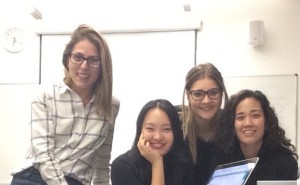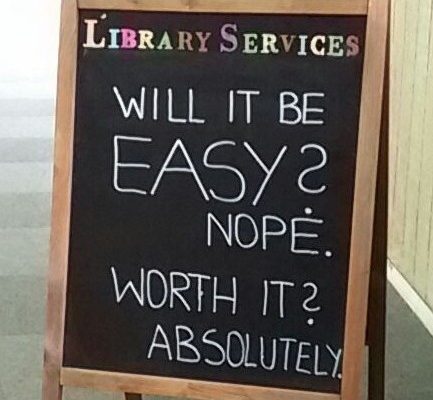As a fresh alumna of Marketing Communications MA (I graduated just a couple of weeks ago!), I would like to share some words on the most important project of the Masters degree: the dissertation.
Having finished that stage myself very recently, I know how unsettling and overwhelming it can be for current students. And even those who are looking for a Masters now, I guess it’s something that triggers curiosity and interest – like me when researching MA courses and scholarships in 2014.
In my case, I was assigned to develop a marketing communications campaign for a real brand. Called Integrated Marketing Communications (IMC), it consists of a practical application of everything we’ve learned throughout the year.
In a nutshell, we had to analyse the market, brand and target audience, identify a marketing opportunity and build a marcomms campaign strategy using appropriate tools (PR, advertising, digital media, etc). It’s like putting together all the knowledge I’ve learned after months of training.
As you might imagine, it’s a long, intense and sometimes nerve-wrecking process. There were countless nights spent awake, not to mention the editing/re-editing never-ending loop, pints (of coffee) and so much research that even my laptop went bonkers sometimes. It demands a lot of energy, time and focus, especially because we had to carry on with other assignments and exams at the same time.
It’s not a piece of cake of course, but I can assure you that you get out of it much more prepared intellectually and professionally for your onward career. Having learned a lot during this process and earned a Distinction for my dissertation, I’d like to share some handful tips and advice based on my own journey.
A quick note beforehand: my dissertation was more a business-focused and practice-based project, which might be different from a Masters in Science or Politics, for example. But don’t go yet: even if you are from another course or area, I’m assure you will be familiarised as we all go through similar things and feelings, so hop in already!
1. Choose a topic you’re passionate about – and get out of your comfort zone

One of the first things that my teachers advised was to choose a brand or topic we liked. We even made a quick in-class survey to find out which brands we loved, liked, hated and didn’t care at all – needless to say that Apple was the most loved brand of the class!
Looking back, that comment was absolutely on point. You have to select the theme wisely as you will spend a good amount of time and efforts on it. Therefore, the more you enjoy it, the better and easier it will be for you.
Now, if you are a business student and need to work on a “case study” type of project, it doesn’t have to be necessarily your favourite brand or company. You can guide your choice based on the type of product, service or even experience. Pick something you feel instigated to learn more about and take you out of your comfort zone. Be bold and choose a theme that challenges you!
In my case, after a long brainstorm, I based my choice on an Italian food brand operating in the UK called Napolina. As unusual as it sounds, it was the best decision I’ve ever made, and I’ll tell you why.

Firstly, I am a massive fan of Italian cuisine so I knew the product really well; secondly, it is a worldwide popular staple, so there was a good amount of market and consumer data available; lastly, it involved the FMCG sector, which is something that I wanted to step in and explore as a brand new world for me.
For someone who imagined doing a project on a familiar household brand such as Samsung, Cadbury or LEGO in the beginning, I never thought I’d choose a completely unknown brand (at least until I started living in London and grocery shopping), let alone in the pasta market! Changes in the route happen, so be prepared to make adjustments, especially if you cannot find enough data about the theme you initially considered.
2. Don’t just stay in your campus library or your room. Explore London!

In my opinion, a dissertation is a combination of research, logical reasoning, intuition and a touch of creativity (at least for Marketing Communications!). These four elements mixed together lead to good judgement, innovative approach and a well-grounded work. How to achieve that? Surely not by just staying in the library or in your room!
Now, as most of you might already know, London is a phenomenal city where you breathe culture, art and history – so live it as much as you can. Explore, taste and see it for yourself! Some of the biggest ideas I’ve had for my academic projects came unexpectedly while I was out enjoying the city. Creativity and inspiration don’t come inside four walls.
Besides, London has a fantastic set of places and resources which can greatly help on your research, so don’t limit your sources to your campus library. Since you will be spending much of your time reading and fetching information, I suggest visiting external libraries such as the City Business Library and British Library.
Both are free to access and offer fantastic resources, especially for business students. For example, I consulted there Keynote, MarketLine and other special reports which were not available on the university e-library – and all these sources helped me tremendously. Even if you go just as a tourist, you have to check those libraries, seriously!
3. Ask, discuss, share – you learn through dialogues and connections
When I first read “private studies” on my course handbook in the beginning of the year, I imagined myself surrounded by piles of books, notebooks full of scribbles and mugs of coffee in complete silence, on my own. That didn’t happen at all – and I’m glad it didn’t, because I learned a lot more through the dialogues, ups-and-downs and instabilities that life *really* is. You will understand what I mean when you get there too!
The most important lesson I took was that a great part of my dissertation work reflected from the relationships and connections I’ve built. In other words, all the conversations and discussions with friends, teachers, family and even people who I’ve worked with helped me to shape the ideas for my project.
So don’t be afraid to ask for advice and exchange ideas – and that goes beyond your direct supervisor and classmates. For my project, I aimed at millennial mums as the key target consumer, so I went on and asked real mums for opinions, such as a family friend who is both a mum and a nutritionist and even my boss who has young kids! Those conversations really opened my mind and made me understand the challenges that young mothers go through, which were paramount to underpin my marcomms campaign strategy.
Be proactive and reach out to other teachers to enrich and deepen your ideas – don’t limit your conversations only to your project supervisor. You will be amazed by the support you can receive from the lecturers! One of my favourite teachers kindly took his time to discuss my thoughts even though I was not his direct supervisee. The same happened to my professors from other modules – all of them were supportive and welcoming. The more you discuss about your ideas, the closer you’ll get to excellence and consistency.
4. Build a network of close friends whom you trust and help others

At university, I made a group of friends with whom I did almost all of my coursework projects together.
We were basically four girls with different cultural and professional backgrounds, personalities and set of skills which mixed incredibly well. I was lucky to find three smart, dedicated and outspoken ladies to share my thoughts, doubts and laughs. After we ended our group projects, we helped each other while developing our individual dissertations with creative insights, suggestions and a lot of emotional support.
So what I’d suggest is to nurture a close friendship with people who share the same vision, goals and commitment as you do. The trust you build and the moments you cherish together are precious and will stay with you forever.
On the other hand, it’s incredible how much you can learn just by sharing ideas and engaging into conversations in a broader sense. I felt genuinely glad whenever someone from my class would come up to ask for help or simply request my opinion. So even if you are extremely busy with your own assignments, always make time to listen and help others somehow.
Avoid the unhealthy competitiveness and self-pressure of comparing yourself to your classmates. University is not the place to be competitive against your peers – it is to learn and evolve yourself to be a better you, so keep that in mind! 😉
5. At the very end, it is about how much you learn – and what you do with it

Good grades are indeed important and great accomplishments, but don’t take it as the main goal of your studies or you will miss the core meaning of the Masters experience. You may not realise it now, but in the end, it’s all about the learning and the knowledge you acquire. All the rest is complementary.
In my case, I’ve learned so much about so many new things I never dreamed of knowing twelve months ago! For example, I got the chance to learn about the FMCG sector, trade distribution, push-pull strategies, how to integrate and evaluate a marketing communications campaign and much more thanks to my dissertation project. Most importantly, I took the opportunity to understand the challenges, behaviour and underlying desires of real working mums, which was incredibly enlightening for me personally.
Regardless of your dissertation subject and where it may lead you, focus on learning and keep on challenging yourself to render the best work you can. Create something that will make yourself proud when you read it again years later. Do it for you, as you are solely in charge of the journey that is entirely yours, and yours alone! 🙂
- 5 differences between British and Brazilian postgraduate education - June 16, 2018
- Carol and her inspirational journey from Brazil to UK - October 2, 2017
- My career in Brazil one year after graduating from Masters at Westminster - March 17, 2017
